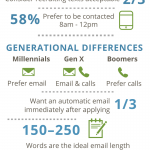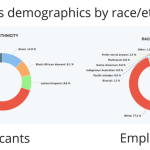Most People Are Afraid To Do This One Thing That Can Help Them Land Their Dream Job
One of the biggest inefficiencies in the job market may surprise you: employee referrals.
A new survey done by Beyond.com, a career content and job site, and Future Workplace, a research firm, finds that 71% of hiring managers say that employee referrals are their best source for finding job candidates. But only 7% of job seekers reported asking for referrals as a top strategy for landing a position.
This gap is “mind-blowing,” says Dan Schawbel, partner and research director at Future Workplace. “People are wasting so much time on job boards and not getting responses back.” It seems obvious to ask friends, friends-of-friends, or former colleagues to email your resume to HR, “but people don’t do it because it’s much easier to hide behind the computer and hit submit.”
But if you’re serious about landing a new position, know this: “If you qualify for an open position, and you are referred, you will get an interview,” says Rich Milgram, founder and CEO of Beyond.com. Here’s how to make the ask.
Network Before You Need To
“Networking is a lost art,” says Milgram. You’ve heard it before, but networking should be about good conversations with good people before anyone has a need for anything. Ideally over the years, you’ve been getting to know lots of different people at lots of different companies, and doing favors for anyone you can. Even if your closest friends are not working anywhere you would ever consider, they may have acquaintances who do, and they would be willing to introduce you.
Related: How I Learned To Stop Hating Networking Events (Mostly)
Think Win-Win
People may not ask for a referral because it feels like a huge favor. But unless you are spectacularly incompetent, you are not asking anyone to go way out on a limb. “Companies want people that are referred,” says Milgram. “It jumps about five steps in the application and hiring process. Those five steps cost money.” Also, there is reasonable evidence that people with a good friend at a workplace are more engaged (and thus likely to stay longer). Hiring you means your friend might stay longer, and it means you will likely stay longer, too. You don’t want to ask with any sense of entitlement, but remember, “They’re your friends,” says Milgram. “They should want to help you. Also, they should want to help their company.”
Ask For Intel
The best way to approach the conversation is to tell your friend you were considering her company as a place you might want to work, and you want her honest opinion of the place. Ask what life there is like. Ask about who does well at the company, and if your friend is happy. You might find out she’s totally miserable, in which case, “maybe it’s not a good fit anyways,” says Schawbel. But if she raves about the organization and her colleagues, ask if she thinks you’d be a good fit. The odds are good she will say yes.
Close The Deal
If you don’t know of any open positions, ask your friend to let you know when any do come up. People who aren’t hiring managers don’t naturally think through lists of potential candidates when they know someone else is leaving or a position is being created, so you want to be top of mind. If you do know of an open position you’re interested in, ask your friend about the best way to get your resume to the right person. She will either know or do some research and report back.
You still have to shine in the interview and convince the hiring manager, of course. Indeed, this is another reason your friend isn’t taking a big risk: It’s ultimately the hiring manager’s responsibility to get the right person in the right spot, not the person doing the referring. But your odds are much better if you are referred than if you use most other job-hunting techniques.
Are you networking or nagging?
Fast Company , Read Full Story
(27)














